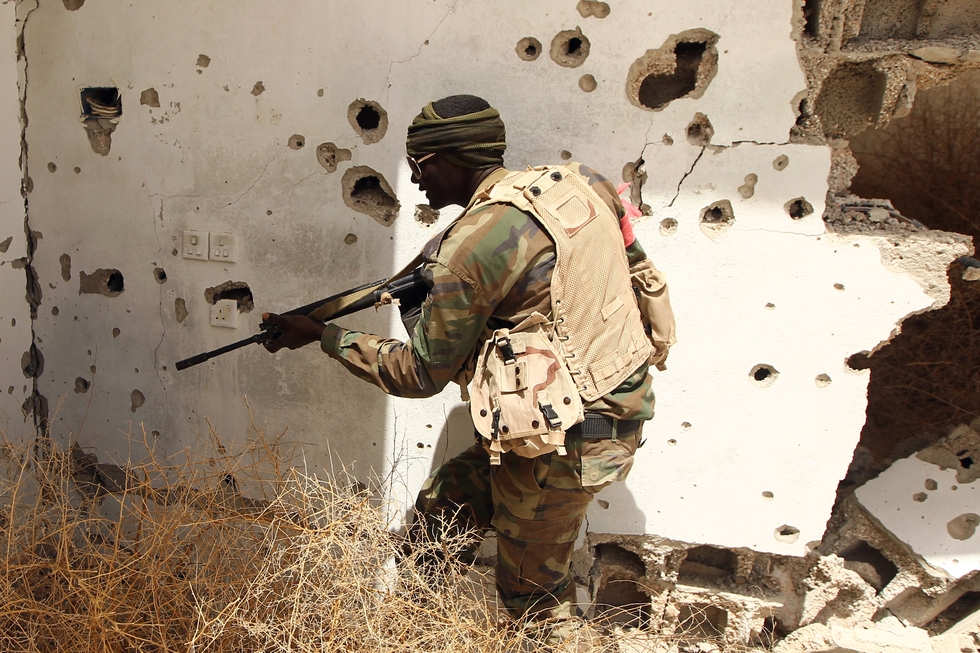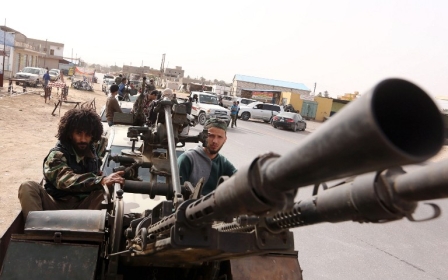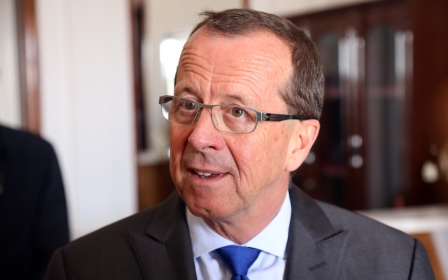World powers ready to arm UN-backed Libyan government

The US and other world powers said on Monday at a summit in Vienna that they were ready to support the lifting of an arms embargo on Libya and supply the UN-backed unity government with weapons to fight the Islamic State (IS) militant group.
The countries and international organisations in attendance said they would "fully support" the efforts of the unity government to push for exemptions from a UN arms embargo on Libya, according to a communique published on the US State Department website.
Monday's meeting in the Austrian capital came amid more reports of western military involvement in the battle against IS in the conflict-stricken north African country.
On Monday, Libyan soldiers from Misrata fighting against IS told Middle East Eye that well-armed US troops were conducting patrols close to the frontline and were communicating with senior local commanders.
"The Government of National Accord (GNA) has voiced its intention to submit appropriate arms embargo exemption requests to the UN Libya Sanctions Committee to procure necessary lethal arms and material to counter UN-designated terrorist groups and to combat Daesh throughout the country," said the communique, using an alternate name for the Islamic State.
"We will fully support these efforts while continuing to reinforce the UN arms embargo."
The communique also dismissed the claims to represent Libya of two rival governments in Tripoli and Tobruk, and said it would only recognise national economic institutions, including the Central Bank of Libya (CBL), the National Oil Corporation (NOC), and the Libyan Investment Authority (LIA) functioning under the "sole stewardship of the GNA".
Last month, the UN blacklisted an oil tanker carrying a shipment of crude sold by a rival NOC operated by the Tobruk-based government to buyers reputed to be in the United Arab Emirates.
"We reiterate our commitment to ceasing support to and official contact with parallel institutions. The GNA is the sole legitimate recipient of international security assistance and is charged with preserving and protecting Libya’s resources for the benefit of all its people," the communique said.
Speaking to the press following the publication of the communique, US Secretary of State John Kerry, who co-chaired the meeting, said Libya had a government that was ready to "go to work".
He continued: "Everyone has seen the hardships that are being experienced by the Libyan citizens in all regions and members of every clan and every tribe in Libya, and they have witnessed the emergence of a new threat to their country in the form of the terrorists who are affiliated with Daesh.
"It is imperative to put the international community's full weight behind the government of national accord. The GNA is the only entity that can unify the country and address the economic crisis and the humanitarian suffering. The Libyan people want a government. A government is here, supported by the international community and ready to go to work."
The conference was co-chaired by the US and Italy, Libya's former colonial ruler, which has faced a major influx of refugees and migrants from Libya braving a perilous sea voyage.
Other signatories of the communique included the UN, the Arab League, the African Union, the European Union, and Saudi Arabia, the UAE, Qatar, Egypt, Tunisia, Jordan and Algeria.
Chaos has reigned in Libya since the 2011 NATO-backed overthrow and killing of long-time leader Muammar Gaddafi. Militias have controlled large parts of the country, while rival parliaments have attempted to assert authority over oil and gas reserves that are the largest in Africa.
Amid the chaos, IS has emerged as a potent threat, commanding an estimated 6,000 militants and seizing control of the central city of Sirte, the birthplace of the late Gaddafi, and surrounding areas.
Covert operations
With IS just 200 miles from the shores of Europe, international powers have grown increasingly concerned about the group’s close proximity, which has led to mounting reports of covert military operations taking place on Libyan territory.
Kobler, the UN envoy, previously told MEE that the priority in Libya was not international military assistance, but rather forming a united army that could re-establish order and take on IS.
However, the GNA has failed to establish its authority fully, and a rival parliament in the Libya's east - the House of Representatives - continues to operate in defiance of international pressure.
Despite the lack of a functioning unity government, American, British, Jordanian and French special forces have all been reported to be carrying out military operations against IS in Libya.
On 12 May, the Washington Post quoted unnamed American officials who confirmed two teams of under 25 troops had been deployed to the cities of Misrata and Benghazi to “identify potential allies among local armed factions and gather intelligence on threats”.
In March, MEE revealed that British and Jordanian special forces were working together in covert operations against IS, while in February Reuters reported that elite French troops were advising Libyan troops in the east about how to take on IS.
Over the weekend, Britain's Daily Mail reported that "up to 50" British troops may be deployed to Libya this week, after the British Royal Air Force carried out a cyber attack against the IS stronghold of Sirte.
Meanwhile, after reports in March suggested Italy might send up to 5,000 troops into Libya, the country's Prime Minister Matteo Renzi told Italian daily Corriere della Serra ahead of the summit that Nepalese troops would be sent to support the UN Support Mission in Libya instead of Italians.
International forces are likely to struggle in finding a reliable local partner as long as domestic political divisions continue to plague Libya.
The GNA has failed to get the endorsement of veteran army strongman Khalifa Haftar, who has launched a war against militias that he says is aimed at ridding the country of Islamists, but which his opponents claim is a power grab aimed at returning Libya to authoritarianism.
A rival Tripoli-based government - the self-declared Government of National Salvation - has also not recognised the GNA unequivocally, with its prime minister telling his cabinet to continue work in April despite a statement issued under the administration's name declaring support for the GNA.
However, the unity government has garnered support from key institutions including the central bank and the NOC.
Libya's divisions have deepened in recent days, with the GNA and Haftar forces each announcing separate plans to fight IS and "liberate" Sirte.
"This is a mistake. It must be prevented... we can no longer accept this division," said Nicola Latorre, chairman of the defence committee of the Italian senate and an IS expert.
He said Haftar's bid to take on IS alone would undermine the UN-backed government, adding that the Vienna talks could help unite ranks and possibly lead to the creation of an international contact group on Libya.
Middle East Eye propose une couverture et une analyse indépendantes et incomparables du Moyen-Orient, de l’Afrique du Nord et d’autres régions du monde. Pour en savoir plus sur la reprise de ce contenu et les frais qui s’appliquent, veuillez remplir ce formulaire [en anglais]. Pour en savoir plus sur MEE, cliquez ici [en anglais].




